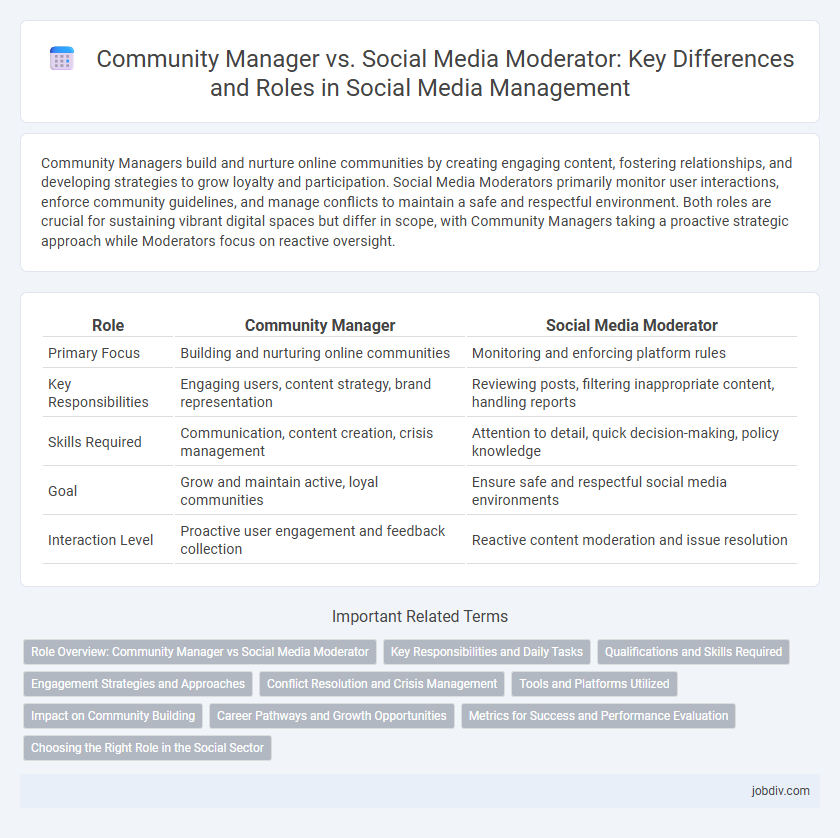Community Managers build and nurture online communities by creating engaging content, fostering relationships, and developing strategies to grow loyalty and participation. Social Media Moderators primarily monitor user interactions, enforce community guidelines, and manage conflicts to maintain a safe and respectful environment. Both roles are crucial for sustaining vibrant digital spaces but differ in scope, with Community Managers taking a proactive strategic approach while Moderators focus on reactive oversight.
Table of Comparison
| Role | Community Manager | Social Media Moderator |
|---|---|---|
| Primary Focus | Building and nurturing online communities | Monitoring and enforcing platform rules |
| Key Responsibilities | Engaging users, content strategy, brand representation | Reviewing posts, filtering inappropriate content, handling reports |
| Skills Required | Communication, content creation, crisis management | Attention to detail, quick decision-making, policy knowledge |
| Goal | Grow and maintain active, loyal communities | Ensure safe and respectful social media environments |
| Interaction Level | Proactive user engagement and feedback collection | Reactive content moderation and issue resolution |
Role Overview: Community Manager vs Social Media Moderator
Community Managers strategically cultivate and nurture online communities by developing engagement plans, managing brand reputation, and analyzing community metrics to foster long-term growth. Social Media Moderators focus on real-time content monitoring, enforcing community guidelines, and addressing user behavior to maintain a positive and safe digital environment. Both roles collaborate to enhance user experience, but Community Managers emphasize proactive community development while Moderators prioritize reactive content regulation.
Key Responsibilities and Daily Tasks
Community Managers develop engagement strategies, create content calendars, and analyze community growth metrics to foster long-term brand loyalty. Social Media Moderators focus on monitoring user interactions, enforcing platform guidelines, and promptly addressing inappropriate content to maintain a safe online environment. Both roles collaborate to enhance user experience while balancing content creation and community oversight effectively.
Qualifications and Skills Required
Community Managers require strong strategic planning, content creation, and analytics skills to foster engagement and grow online communities, with a background in marketing, communications, or social sciences often preferred. Social Media Moderators need excellent attention to detail, conflict resolution abilities, and familiarity with platform-specific guidelines to enforce community standards effectively, typically requiring experience in customer service or digital moderation. Both roles demand proficiency in social media tools, excellent communication skills, and adaptability to evolving digital trends.
Engagement Strategies and Approaches
Community Managers design long-term engagement strategies by fostering authentic interactions and nurturing brand loyalty across multiple platforms. Social Media Moderators focus on real-time content monitoring, enforcing guidelines, and facilitating positive conversations to maintain community standards. Both roles require a deep understanding of audience behavior, but Community Managers emphasize proactive growth while Moderators handle reactive conflict resolution.
Conflict Resolution and Crisis Management
Community Managers oversee conflict resolution by fostering positive engagement and mediating disputes within online communities, ensuring long-term relationship building. Social Media Moderators focus on immediate crisis management by swiftly identifying and removing harmful content to prevent escalation and maintain platform safety. Both roles require strong communication skills but differ in scope, with Community Managers emphasizing strategic conflict mitigation and Moderators prioritizing real-time enforcement.
Tools and Platforms Utilized
Community Managers leverage comprehensive platforms like Sprout Social, Hootsuite, and Buffer to schedule content, analyze engagement metrics, and manage multi-channel campaigns. Social Media Moderators primarily use specialized moderation tools such as Brandwatch, Crisp Thinking, and Unity to monitor user-generated content, enforce community guidelines, and filter harmful interactions in real-time. Both roles rely on collaboration software like Slack and Trello to coordinate efforts and ensure consistent communication across teams.
Impact on Community Building
Community Managers drive engagement by creating strategies that foster long-term relationships and brand loyalty, leveraging analytics to tailor content and events that resonate with the audience. Social Media Moderators ensure a safe and respectful environment by enforcing guidelines, promptly addressing conflicts, and filtering out harmful content, which maintains community trust and participation. Both roles contribute to community building, with Community Managers focusing on growth and engagement while Moderators sustain the quality and safety of interactions.
Career Pathways and Growth Opportunities
A Community Manager drives strategic growth by creating and nurturing brand communities across platforms, focusing on engagement metrics, content planning, and long-term loyalty development. Social Media Moderators ensure compliance with platform guidelines and protect community health by managing user interactions, which offers foundational experience but typically leads to specialized roles in content moderation or customer support. Career pathways for Community Managers often advance toward digital marketing, brand strategy, or social media leadership roles, while Social Media Moderators may progress into senior moderation, policy enforcement, or data analysis positions within social ecosystems.
Metrics for Success and Performance Evaluation
Community Managers measure success through engagement rates, growth in active members, and sentiment analysis within the community, focusing on long-term relationship building and brand loyalty. Social Media Moderators primarily track response time, content compliance, and the volume of moderated posts to ensure platform safety and adherence to guidelines. Both roles utilize analytics tools but emphasize different KPIs aligned with their strategic objectives in online community management.
Choosing the Right Role in the Social Sector
Choosing the right role in the social sector depends on your skills and goals: a Community Manager strategizes and grows online communities to build brand loyalty, while a Social Media Moderator focuses on monitoring content and enforcing guidelines to maintain respectful interactions. Community Managers engage with audiences across platforms to foster meaningful conversations and drive engagement, whereas Moderators ensure safety by filtering harmful content and addressing conflicts promptly. Understanding these distinctions helps organizations optimize their social presence and create supportive environments for users.
Community Manager vs Social Media Moderator Infographic

 jobdiv.com
jobdiv.com